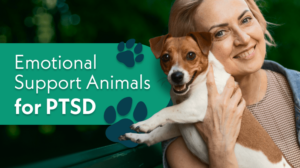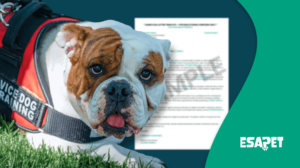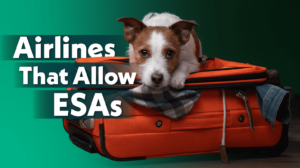Frontier Airlines Pet Policy: How to Fly with Your Pet

Traveling by air can be a nerve-wracking experience, especially when your pet is coming along. With Frontier Airlines’ comprehensive pet policy, both you and your furry friend can have a comfortable and stress-free flight.
Whether it’s a quick domestic hop or a longer journey, understanding Frontier Airlines’ pet policy is essential. This guide will walk you through everything you need to know before you head to the airport.
Frontier Airlines Pet Travel Rules
Frontier Airlines has specific guidelines for traveling with pets. They permit domesticated dogs, cats, guinea pigs, rabbits, hamsters, or small birds on domestic flights within the United States. Pets traveling within the United States must be at least eight weeks old.
You don’t need a health certificate for flights within the U.S., but check state-specific regulations. Frontier only accepts dogs and cats for international travel to Mexico and the Dominican Republic. They might ask for a health certificate dated within certain ranges.
Frontier’s cabin rules guarantee comfort and safety. Pets must remain in carriers that fit underneath the seat in front of you to prevent discomfort and mess, avoid feeding your pet during the flight.
TLDR: Frontier Airlines allows small pets in the cabin on domestic flights. It limits international pet travel to the Dominican Republic and Mexico. Pets must travel in carriers that fit underneath the seat. You need to have the required documentation ready.
Frontier Airlines Fees for Pet Travels
Service animals traveling on Frontier Airlines comes with its own set of travel fees and regulations. For every flight, regardless of the destination, Frontier charges a fee of $99 per pet each way. This fee allows your pet to stay in the cabin, housed in a carrier that fits under the seat in front of you.
Service animals are an exception to this fee. They can travel free of charge, provided all guidelines are followed. Emotional support animals are treated like regular pets; thus, the $99 fee applies.
ESAs are Exempt from Pet Fees for Housing |
|
According to the FHA, Emotional Support Animals and Service Dogs are exempt from any housing pet fees, deposits or pet rents. |
Frontier Airlines Standards for ESA and Service Animals
Frontier Airlines has specific regulations for service animals and Emotional Support Animals (ESAs) on their flights:
- Service Animals: Frontier Airlines accepts only dogs as trained service animals. These animals can travel in the cabin at no charge to assist passengers with disabilities.
- Psychiatric Service Dogs: These dogs must be fully trained. They are the only type of psychiatric service animals accepted. They are treated under the same rules as other service animals.
- Emotional Support Animals (ESAs): Emotional support animals are no longer recognized separately. ESAs must now travel under the standard Pet Policy, which includes a required fee.
Frontier Airlines and the ACAA
Frontier Airlines has adjusted its policies to align with the Air Carrier Access Act (ACAA). This law is designed to accommodate passengers with disabilities. Historically, the ACAA allowed for a broad inclusion of ESAs in plane cabins.
However, since 2021, the ACAA no longer covers Emotional Support Animals, narrowing the definition of service animals to dogs trained to perform tasks for an individual with a disability. In addition, it is now up to the airlines to define their own pet policy for ESAs – some airlines are ESAs pet-friendly, offering several benefits in domestic or international flights.
Frontier itself no longer recognizes ESAs as a distinct category with special privileges. This policy change means that any animal previously flying as an ESA must now adhere to Frontier’s standard pet policy, which includes paying the pet fee and meeting the airline’s pet travel requirements.
For passengers with service animals, Frontier continues to provide accommodations as per the ACAA, ensuring accessibility and safety for all travelers without extra charges for these animals.
Allowed Support Animals
Frontier Airlines accommodates a variety of small animals for travel on domestic flights. It ensures that pet owners have options for bringing their companions along. However, the policies are more restrictive for international destinations flights. The airline has specific requirements on the size and management of animals during the journey.
Here’s a detailed overview of the types of animals allowed, where they can travel, and the associated fees:
Animal |
Permitted on |
Fees |
| Dogs | In-cabin | $99 each way |
| Cats | In-cabin | $99 each way |
| Small Household Birds | In-cabin | $99 each way |
| Hamsters | In-cabin | $99 each way |
| Rabbits | In-cabin | $99 each way |
| Guinea Pigs | In-cabin | $99 each way |
Note: Frontier Airlines restricts the animals allowed to take international flights to dogs and cats. All animals must travel in a carrier that fits under the seat before you, measuring no larger than 18” X 14” X 8”.
This carrier counts as an extra personal item to your standard carry-on bag. Pets larger than the stipulated carrier size will need alternative arrangements. Frontier does not allow pets traveling in the cargo hold.
Breed Restrictions on Frontier Airlines
Frontier Airlines has specific restrictions on which animal breeds are allowed to travel in the cabin. To ensure the safety and comfort of all passengers and crew, Frontier prohibits certain types of animals from flying. Frontier Airlines does not accept:
- Parrots
- Macaws
- Cockatoos
- Birds of prey
- Mice
- Rats
- Squirrels
- Beavers
- Ferrets
- Snakes
- Amphibians
- Spiders
- Insects
These restrictions apply regardless of the domestic or international nature of the flight.
Allowed Cat Breeds in Cabin
Frontier Airlines permits domesticated cats to travel in the cabin, provided they are at least 8 weeks old. There are no specific breed restrictions for cats. However, all traveling cats must be healthy, well-behaved, and carried on flights within an approved carrier.
Allowed Dog Breeds in Cabin
Similar to cats, domesticated dogs are allowed in the cabin if they are a minimum of 8 weeks old. Frontier does not specify breed restrictions for dogs traveling in the cabin. However, all dogs must be kept in an approved carrier during the flight. The dog needs to exhibit good behavior and health.
Frontier Airlines ESA Requirements
Traveling with an Emotional Support Animal (ESA) on Frontier Airlines requires understanding their specific rules. Since the regulations surrounding ESAs can be quite strict, knowing what is allowed and what restrictions apply beforehand can make your journey smoother and more enjoyable.
Allowances
- Type of Animals: Frontier Airlines permits ESAs that are either dogs or cats. These animals are recognized for the emotional support they provide to their owners during flights.
- Number of ESAs: Each passenger is allowed to bring one ESA on board. This ensures that the animals can be properly managed and cared for during the flight.
- Advance Notice: Passengers must notify Frontier Airlines at least 48 hours in advance if they plan to travel with an ESA. This advance notice helps the airline make necessary accommodations and ensures everything is set for a smooth travel experience.
Restrictions
- Documentation: Passengers are required to provide specific documentation for their ESA, which may include a recent health certificate and proof of behavior training to ensure the safety of all passengers on board.
- Behavior: ESAs must be well-behaved and under control at all times. They should not exhibit aggressive behaviors or pose a threat to the safety and comfort of other passengers.
- Cabin Placement: ESAs must remain in the airline’s designated cabin area, usually at the feet of the passenger or under the seat. They cannot occupy seats themselves.
- Food and Water: It’s recommended to avoid feeding the ESA right before or during the flight to prevent any discomfort or need for frequent bathroom breaks.
Frontier Airlines Instructions for ESAs and Service Animals
When planning to travel with an Emotional Support Animal (ESA) or service animal on Frontier Airlines, there are some key things you’ll want to remember to make sure the trip is comfortable for both you and your pet. Frontier has specific rules to ensure safety and compliance, so here’s what you need to know:
Things to Know Before Traveling With Pets in the Cabin
- Type of Animals Allowed: Frontier permits domesticated dogs, cats, rabbits, guinea pigs, hamsters, or small household birds may be allowed in the cabin. However, it’s crucial to check the most recent guidelines as these can change.
- Pet Carrier Requirements: Your pet must stay in a carrier that can fit under the seats in front of you throughout the flight. The carrier needs to be secure, ventilated, and large enough for your pet to stand, turn around, and lie down comfortably.
- Advance Notification: You should notify Frontier that you will be bringing an ESA or service animal at least 48 hours before your flight. This allows the airline to make necessary preparations and ensures a smoother check-in process at the airport.
- Behavior and Documentation: Your animal should be well-behaved and under control in the airport and on the plane. You might also need to provide documentation proving that your animal is indeed an ESA or service animal, particularly for service animals that are expected to perform specific tasks for those with disabilities.
- Check Local and International Flights Requirements: Additional health certificates or documentation about vaccinations, particularly rabies vaccine, might be required if looking to fly internationally. Each country has its own regulations on pets, so verifying these details before your next flight can prevent any last-minute issues.
Required Forms and Documents for ESAs
Suppose you’re planning to fly with your Emotional Support Animal (ESA) or Psychiatric Service Dog (PSD) on Frontier Airlines. In that case, you’ll need to have a few key documents ready to ensure everything goes smoothly. Here’s a list of essential paperwork you need to prepare:
- ESA/PSD Letter: This is an official document from a licensed mental health professional stating the need for your ESA or PSD.
- Behavior Form: A form that confirms your animal’s good behavior and ability to handle a public setting like an aircraft.
- Health Form: This form attests to your animal’s health and vaccination status.
ESA Letter or PSD Letter
Having an ESA or PSD letter can significantly impact fees, permissions, and restrictions when flying. For ESAs, most airlines, including Frontier, now treat them as regular pets, which means they are subject to pet fees.
However, PSDs are recognized under the Americans with Disabilities Act, allowing them to fly with no additional fee. The rights and requirements for each letter differ. An ESA letter simply requires a statement from a mental health professional, while a PSD letter often requires evidence of specific training related to managing a disability.
Behavior Form
The behavior form is crucial as it reassures the airline that your ESA or PSD is well-behaved and won’t cause disruptions during the flight. This form is often provided as part of the ESA letter acquisition process through ESA Pet, which helps streamline the process and ensure all requirements are met efficiently.
Health Form
A health form is also necessary to ensure that your pet does not pose a health risk to passengers and crew. This includes up-to-date vaccination requirements and a general health check. Just like the behavior form, ESA Pet offers this as an additional service, helping pet owners prepare all necessary documents in one go, making the air travel preparations less stressful.
Getting an Official ESA Letter and Additional Documentation
Looking to get an official Emotional Support Animal (ESA) letter and additional documentation through ESA Pet? It’s a simple three-step process that’s straightforward and designed to verify that those who need these supportive animals can receive them legitimately. Here’s how you can get started:
Step 1: Fill Out a Quick Online Survey
Kick things off by completing a short survey with ESA Pet. You’ll answer some questions about your mental and emotional state. This step is crucial as it helps the mental health professionals at ESA Pet understand your needs better and assess if an ESA could significantly improve your quality of life. Your privacy is a top priority, so rest assured that all your responses are kept confidential and only accessible to authorized personnel.
Step 2: Consultation with a Licensed Healthcare Professional
After your survey and payment are processed, ESA Pet will connect you with a licensed healthcare professional in your state. This expert will evaluate your mental health more closely in a consultation to determine if an ESA is appropriate for your situation.
Step 3: Receive Your ESA Letter
If the healthcare professional confirms that an ESA would benefit you, they will issue a signed ESA letter. ESA Pet ensures you receive a digital copy of this letter within three business days. This document serves as formal proof that your pet is essential to your mental health treatment.
The entire process with ESA Pet is not just about obtaining a letter; it’s about ensuring that the support from an ESA is accessible to those who truly need it, backed by legal documentation.
Get your Official ESA Letter Consultation from a licensed therapist.
Get ESA Letter Now
Prepping the ESA for Travelling
When you’re planning to travel with your Emotional Support Animal (ESA), it’s important to make sure they’re as comfortable and stress-free as possible during the trip. Here are some best practices to consider:
- Familiarize Your Pet with the Carrier: Spend some time getting your ESA used to the travel carrier before the day of the flight. Let them explore it and maybe even take a few short trips to it.
- Keep Their Routine Consistent: As much as possible, keep your pet’s feeding and bathroom routine consistent even while traveling.
- Bring Comfort Items: Pack a favorite toy or a blanket from home to help soothe and comfort your pet during the journey.
- Exercise Before the Flight: Give your pet some exercise before heading to the airport so they’re more likely to be relaxed and possibly sleep during the flight.
- Stay Calm: Animals can pick up on your emotions, so try to stay calm and positive.
Frontier Airlines Pet Policy FAQ
How Much Does Frontier Charge for Dogs?
Frontier Airlines flight charges $99 per pet, each way, to travel in the cabin. Your dog must stay in an approved carrier that needs to fit underneath the seat in front of you throughout the flight.
How Strict Is Frontier With Pets?
Frontier Airlines is quite strict about pet travel. Pets must remain in their travel container at all times and the container itself must meet the airline’s specifications. The pet must also behave properly and not disturb other passengers.
How Do I Add a Pet to My Flight?
To add a pet to your flight on Frontier Airlines, you need to notify the airline in advance, usually at the time of booking. This can be done online through their booking portal or by contacting their customer service.
Can Emotional Support Dogs Fly on Frontier?
Frontier Airlines no longer recognizes emotional support animals as a category different from regular pets. Emotional support dogs can still fly, but they will be treated as normal pets and subject to the usual fees and carrier regulations.
Wrapping Up Frontier Airlines Pet Policy
To wrap up, understanding the Frontier Airlines Pet Policy is essential for ensuring a smooth travel experience for you and your pet. Remember that all pets, including dogs and cats, must travel in an approved carrier that also counts as a carry-on bag.
They are subject to a fee of $99 per pet, each way. Make sure to book your pet in advance, keep them in their carrier throughout the flight, and prepare them properly before the journey. Following Frontier Airlines’ guidelines, you can make traveling with your pet straightforward and stress-free.






